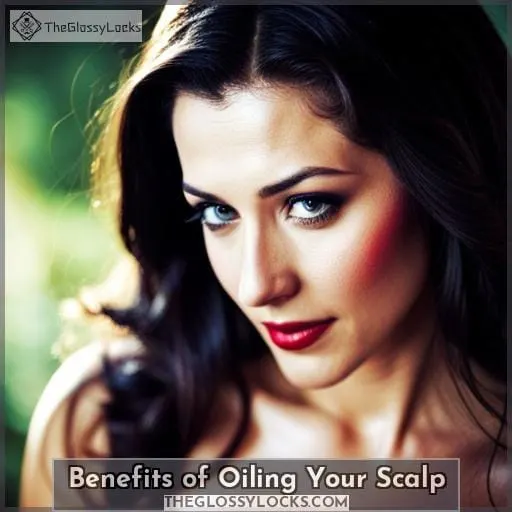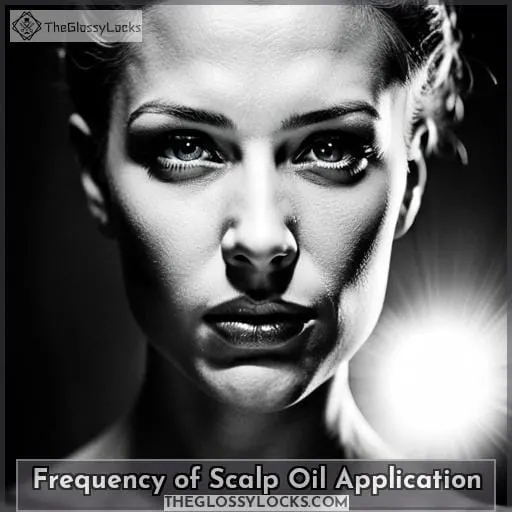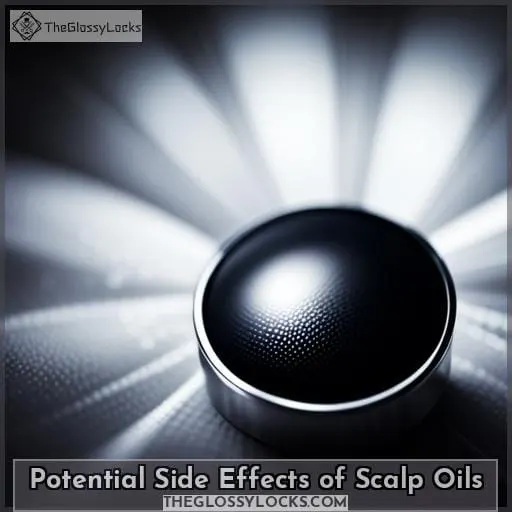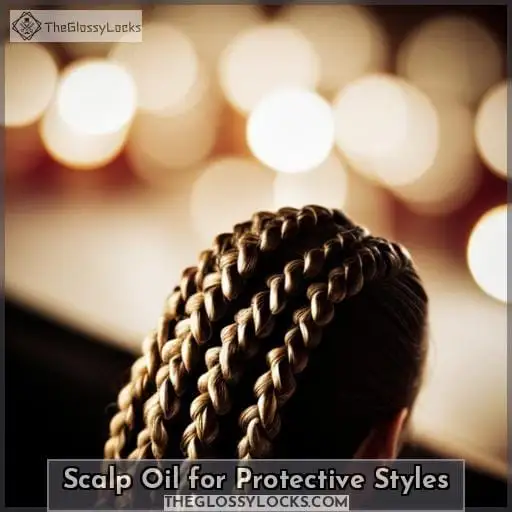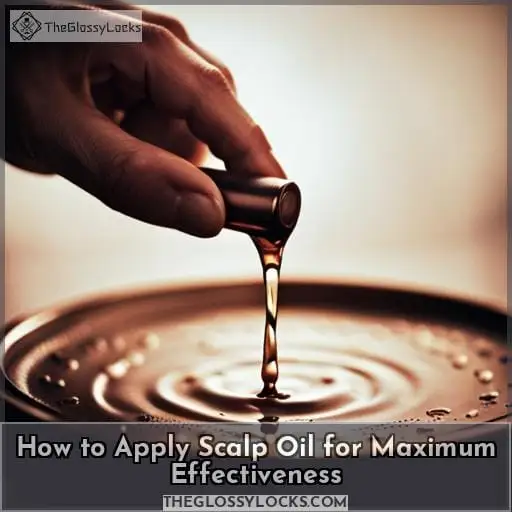This site is supported by our readers. We may earn a commission, at no cost to you, if you purchase through links.

Improved hydration, increased hair growth, and prevention of dryness are just a few of the benefits of scalp oiling. If you want to master the art of oiling your scalp, we’ve got you covered with our step-by-step guide.
First, you need to choose the right type of oil based on your individual needs. There are various oils available, such as coconut oil, argan oil, and jojoba oil, each with its own unique properties.
Once you have chosen the oil, the next question is how often should you apply it? The frequency of scalp oiling depends on your hair and scalp condition. If you have dry or damaged hair, you may benefit from oiling your scalp more frequently, such as once or twice a week.
On the other hand, if you have oily hair, you may want to limit scalp oiling to once every two weeks or even less frequently.
In conclusion, scalp oiling can be a game-changer for your hair care routine. It provides hydration, promotes hair growth, and prevents dryness. By choosing the right oil and applying it at the appropriate frequency, you can enjoy healthier and more vibrant tresses.
Table Of Contents
- Key Takeaways
- What is Scalp Oil?
- Benefits of Oiling Your Scalp
- How to Properly Oil Your Scalp
- Choosing the Right Scalp Oil for Your Hair Type
- Frequency of Scalp Oil Application
- Potential Side Effects of Scalp Oils
- Scalp Oil Recommendations for Different Hair Types
- Scalp Oil for Protective Styles
- How to Apply Scalp Oil for Maximum Effectiveness
- Conclusion
Key Takeaways
- Frequency of scalp oiling depends on your hair and scalp condition.
- Oiling provides hydration, promotes hair growth, and prevents dryness.
- Overuse of oils can lead to skin irritation and clogged pores.
- It is essential to adjust the frequency of oiling based on your lifestyle and hair needs.
What is Scalp Oil?
You can enjoy the benefits of scalp oiling, such as hydration and hair growth promotion, by using carefully chosen oils tailored to your unique hair type and lifestyle. Scalp oil helps nourish the scalp while stimulating circulation for healthier hair follicles.
Peppermint, tea tree, and citrus-based essential oils are some options that promote a healthy environment for optimal growth. It is recommended to dilute these essential oils with carrier oils like jojoba or sweet almond before use on the scalp.
Proper massage techniques should be used when applying oil onto your head to ensure it penetrates into each strand evenly without overdoing it in one area.
Depending on how dry or oily your locks are, it will determine how frequently you should apply an oily treatment. Usually, no more than once a day if daily use is necessary at all (for those with extra dry scalps).
Natural product enthusiasts may opt for Ayurvedic formulas specifically made from natural ingredients like herbs and coconut milk. These formulas contain additional properties that aid in dandruff management. Avoiding certain types of toxins found in commercial products could also help keep microbes balanced on the skin’s surface rather than disrupting them further due to harsh chemicals.
So don’t forget, choose quality-made products wisely according to what works best for you!
Benefits of Oiling Your Scalp
Oiling your scalp regularly is an essential part of hair care. Not only does it promote healthy hair growth, but it also helps to keep your scalp and strands hydrated while preventing dryness.
Hair Growth
Regularly using scalp oils, like Organic Jamaican Castor Oil Hair Growth from IQ Natural, can support hair growth and strengthen your hair roots, so why not give it a try? Oils provide hydration to the scalp, which is essential for healthy locks.
Massaging them into your scalp with proper techniques helps stimulate circulation, which also aids in promoting growth. Diluting essential oils with carrier oil before application should be done for best results.
It is also important to avoid dandruff management options that may disrupt the microbiome of the skin.
Hydration
By massaging your scalp with a nourishing oil, you can help lock in moisture and restore balance to dry hair. Choose an oil that best suits your hair type for maximum hydration benefits – coconut or avocado oils are great options.
For Ayurvedic recommendations, consider rosemary or castor oil, which offer powerful hydration properties. To properly moisturize the scalp, ensure it’s clean before application and massage the product into the roots using circular motions so it evenly penetrates any dry areas.
Hair will be left feeling soft and supple while benefiting from increased strength and shine!
Prevention of Dryness
Applying an oil to your scalp on a regular basis helps prevent dryness and keeps hair hydrated. Techniques for oil application vary depending on the type of oil used. You can heat up the oil for better penetration or massage it in with a comb for deeper absorption.
To restore moisture balance and combat dry hair, using natural products like coconut oil can be effective. Incorporating moisturizing routines into your haircare regimen will leave you feeling refreshed and rehydrated after every wash day.
If you’re unsure which oils are best suited to your specific needs, taking our haircare quiz is a great way to determine the most suitable options for your scalp.
How to Properly Oil Your Scalp
Massage the nourishing elixir into your hair and scalp a few times a week to rejuvenate your locks. Scalp massages can be done with carrier oils such as jojoba, sweet almond, or coconut oil. It is recommended to dilute essential oils in these carriers for safety before applying them directly onto the skin.
When using pre-wash scalp oil treatments, use both wet and dry hands together to massage the product into the roots of your hair while stimulating circulation on your head.
DIY blends are also an option for those wanting more control over their ingredients! Oiling benefits include hydration and strengthening of strands by providing vitamins A & E to all types of tresses – from thick curls to fine straight hairs alike! Choose from various natural products like avocado oil or Jamaican black castor oil that will help strengthen follicles and promote healthy growth without disrupting the scalp’s microbiome balance.
With regular use, you’ll start noticing results quickly without having to worry about oily buildup or damage caused by harsh chemicals found in other products!
Choosing the Right Scalp Oil for Your Hair Type
Oiling your scalp is an important part of any hair care routine, but it’s especially critical for individuals with oily hair. Knowing how often to oil and which type of oil to use can make a big difference in maintaining healthy locks.
From the benefits of massaging your scalp to choosing the right oils for specific types and textures, there are several factors that come into play when determining how often you should be oiling on a regular basis.
Frequency for oily hair
For those with oily hair, it’s best to oil your scalp less frequently than other types. Regular oiling may weigh hair down and promote further oil production, exacerbating greasiness. Stick to once or twice weekly as needed. Apply lightly, focusing on the scalp. Rinse thoroughly and use clarifying shampoos to prevent product buildup.
Opt for oil blends with tea tree or citrus oils to help control excess oil while nourishing hair. Proper cleansing, light oiling, and gentle scalp massage suffice for shiny, healthy hair without overdoing it.
Benefits of scalp massage
By taking the time to give yourself a scalp massage, you can experience numerous benefits that come with increased circulation and relaxation. Stimulating your scalp through massage helps promote healthy hair growth and increases blood flow to nourish follicles.
It also reduces stress levels and improves sleep. Scalp massages are known for reducing tension headaches and stimulating oil production, which helps reduce dryness and itchiness on the scalp. Regular treatments may help reverse some signs of aging and provide relief from dandruff or other skin conditions like psoriasis or eczema.
Choosing the right oil
When deciding on the right scalp oil for your hair type, consider a variety of factors such as essential oils and carrier oils to get the most out of your pre-shampoo treatments.
When selecting an oil, choose one with natural ingredients like avocado or coconut. For heat protection, look for blends containing basil root extract or rosemary extract.
With these Oil Selection Tips in mind, plus knowledge on Carrier Oils Guide and Essential Oil Blends Dos & Don’ts, you’ll be sure to find just the right Scalp Oil Frequency that works best for you!
Frequency of Scalp Oil Application
Knowing your hair type and scalp condition will determine how frequently you should apply oil to keep your scalp hydrated. For those with dry, brittle hair, daily or weekly applications may be beneficial.
Those with oily scalps are better off applying less often, such as every two weeks or once a month.
Optimal massage techniques can help the oil penetrate deeply into the skin and promote circulation for healthier strands of hair. Ayurvedic oils have also been known to provide great benefits when applied on a regular basis.
These oils contain natural ingredients that nourish both the scalp and follicles while providing protection from environmental damage like sun exposure or styling products that could cause breakage over time.
When it comes to protective styles such as braids or twists, using an oil specifically designed for this purpose is best. Look for detoxifying properties in order to flush out bacteria while adding moisture back in without buildup over time, which can lead to clogged pores and further irritation of the skin beneath them.
Finally, if you’re experiencing dandruff issues, try switching up what types of product you use so that they won’t disrupt your microbiome.
Potential Side Effects of Scalp Oils
However, it’s important to be aware of potential side effects when using scalp oils, as they can range from mild irritation to a burning sensation – like having hot sauce poured on your head. Allergic reactions are one of the most common risks associated with oiling the scalp.
It’s best practice to perform an allergy test in advance by applying a small amount of oil behind your ear or inside your elbow before massaging it all over the scalp.
Overuse and incorrect use of certain oils can also cause skin irritation and clog pores, which could lead to breakouts or acne on other parts of the body, such as the face and chest area. It’s important to avoid this at all costs. Additionally, too much oil residue left after shampooing may leave the hair greasy, even if you’ve only used a few drops during treatment, due to its thick consistency.
Last but not least, excessive amounts used regularly might strip natural oils away, leading to dryness and dullness, especially for those with thinner strands who need less product than those with thicker types.
Hence, pay extra attention while determining frequency based on individual needs.
Scalp Oil Recommendations for Different Hair Types
Depending on your hair type, you’ll want to choose a scalp oil that provides the best nourishment and hydration for your individual needs. For dry hair, oils with turmeric extract are excellent choices due to their natural anti-inflammatory properties.
Oils like coconut or avocado are beneficial for regular and oily hair types because they help lock in moisture without weighing down the strands.
Look for sustainable ingredients such as essential oils from botanical plants when selecting a product specifically designed for scalp massage techniques. These oils provide better penetration into skin cells compared to synthetic fragrances added by some brands.
Depending on lifestyle and condition of scalp, oiling frequency should be adjusted accordingly. Daily application may benefit those with dry scalps, while it’s not recommended if you have an oily one already.
In any case, always remember that dandruff management is best done through water-based tonics instead of relying solely on traditional oils alone.
Scalp Oil for Protective Styles
For protective styles, incorporating a detoxifying scalp oil into your routine can help nourish and protect the hair from environmental damage. Detoxifying oils like peppermint, tea tree, and citrus-based ones stimulate circulation in the scalp.
Essential oils should be diluted with carrier oils such as jojoba or sweet almond for best results. Proper application is also key. Massage the oil into the scalp to ensure even distribution throughout the strands.
Choosing suitable oils depends on individual needs. Some favorites include Coconut Oil for deep hydration and Avocado Oil Hair Skin Nails Moisturizer Carrier Oil, which helps maintain moisture balance in both skin and hair.
Ayurvedic therapy has been known to work wonders too. Try Rosemary oil or Jamaican Black Castor Oil for natural dandruff management if needed.
Remember that frequency depends on lifestyle factors, so adjust accordingly. Daily use may not be necessary unless you have a dry scalp, while oily scalps require less frequent applications of oiling products.
How to Apply Scalp Oil for Maximum Effectiveness
To maximize the effectiveness of scalp oil, massage it into your scalp using circular motions for a few minutes. Be sure to use specific scalp massage techniques to target areas in need as well as heat application when possible.
Carrier oils should be used with essential oils that may irritate skin and hair follicles if applied directly on the scalp. Additionally, targeted hair benefits based on individual needs can be sought by applying different types of oils depending on evening or morning application times.
For those looking for an extra boost, pre-shampoo treatment with special nourishing oil blends is recommended once or twice a week—especially beneficial during cold winter months when humidity levels are low.
Conclusion
As you can see, scalp oiling can be a great way to promote hair growth, hydrate, and prevent dryness. When choosing an oil, it’s important to take into account your hair type and lifestyle, as this will influence the frequency of oiling.
Oily hair should oil their scalp less frequently than dry hair. A scalp massage can help stimulate circulation and benefit the scalp. Additionally, essential oils should be diluted with carrier oils for best results.
With the right oil, the proper technique, and the right frequency for your hair type, you can achieve a healthy scalp and beautiful hair.


